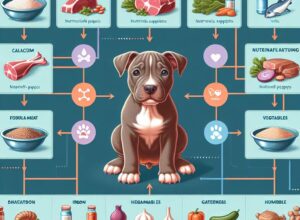
Key Takeaways
-
Probiotics are live microorganisms that can enhance your pitbull puppy’s digestive health and immune system.
-
Introducing probiotics to your puppy’s diet can help alleviate digestive issues and promote nutrient absorption.
-
When selecting probiotics, choose strains known to be beneficial for dogs and ensure they’re in appropriate dosages.
-
Gradually incorporate probiotics into your pitbull puppy’s diet to avoid digestive upset.
-
Consult with your veterinarian before starting any new supplement regimen, including probiotics.
Unlocking the Potential of Probiotics for Your Pitbull Puppy’s Digestive System
When it comes to your pitbull puppy’s health, the digestive system plays a pivotal role. It’s not just about what your pup eats, but also how their body utilizes those nutrients. That’s where probiotics come in – think of them as the unsung heroes in the gut, working tirelessly to keep everything running smoothly.
Boosting Digestive Wellness
A healthy gut is essential for a thriving pitbull puppy. It’s the starting point for good health. Probiotics are the beneficial bacteria that live in the gut and help with everything from breaking down food to fighting off harmful pathogens. These tiny but mighty organisms can make a world of difference in your puppy’s overall wellbeing.
Essential Probiotics: What Are They?
So, what exactly are probiotics? They’re live bacteria and yeasts that are good for your puppy, especially their digestive system. We usually think of bacteria as something that causes diseases. But your puppy’s body is full of bacteria, both good and bad. Probiotics are often called “good” or “helpful” bacteria because they help keep your puppy’s gut healthy.
-
Lactobacillus
-
Bifidobacterium
-
Saccharomyces boulardii
These are just a few examples of probiotic strains that could be beneficial for your pitbull puppy. Each one plays a unique role in promoting health and preventing disease.
Now, let’s dive deeper into the benefits of probiotics for your pitbull puppy’s health.
Top Probiotic Benefits for Pitbull Puppy Health
Improving Gastrointestinal Function
A puppy’s gastrointestinal system can be delicate, and probiotics can help strengthen it. By enhancing the balance of good bacteria in the gut, probiotics aid in digestion and help puppies better absorb the nutrients from their food. This means your pitbull puppy can get more out of their meals and grow strong and healthy.
Strengthening Immune Defenses
Most importantly, a robust immune system is vital for your pitbull puppy, and a significant part of that defense network resides in the gut. Probiotics contribute to creating a barrier against potential infections and bolster the immune response, which is especially important in the early stages of your puppy’s life.
In the next section, we’ll discuss how to choose the right probiotics for your pitbull puppy and how to introduce them safely into their diet. Stay tuned for detailed insights that will help you make informed decisions for your furry friend’s health.
Essentials for Selecting Probiotics for Pitbull Puppies
Choosing the right probiotics for your pitbull puppy is crucial. The market is saturated with various products, each claiming to be the best. However, it’s important to look beyond the marketing and select a probiotic that genuinely suits your puppy’s needs. This means focusing on the quality and suitability of the probiotic strains, as well as the specific needs of your pitbull puppy.
First and foremost, it’s essential to understand that not all probiotics are created equal. The strain and viability of the probiotic are key. You want to ensure that the probiotic you choose contains live and active cultures, as these will be the most beneficial for your puppy’s gut health.
Identifying High-Quality Probiotic Strains
When selecting a probiotic for your pitbull puppy, look for strains that have been proven effective in dogs. These can include Lactobacillus, Bifidobacterium, and Enterococcus. These strains have been shown to survive the journey through the stomach’s acidic environment and reach the intestines, where they can exert their beneficial effects.
Additionally, the source of the probiotic is important. Choose products from reputable companies that have conducted clinical trials or have a strong presence in the veterinary health community. These companies are more likely to invest in the research and development of strains that will benefit your puppy’s health.
Determining the Correct Dosage
The correct dosage of probiotics for your pitbull puppy will depend on their size, age, and specific health needs. It’s always best to start with the manufacturer’s recommended dosage, which is usually based on weight. However, consulting with your veterinarian can provide a more tailored dosage plan for your puppy’s unique situation.
It’s also worth noting that the potency of probiotics is measured in colony-forming units (CFUs). A higher CFU count isn’t always better; what matters most is the right balance and viability of the bacteria.
Safely Introducing Probiotics into Your Puppy’s Diet
Just like any new addition to your puppy’s diet, probiotics should be introduced slowly. This helps prevent any potential digestive upset and allows your puppy’s system to adjust to the new beneficial bacteria.
Step-by-Step Guide for Dietary Transition
Here’s a simple guide to help you introduce probiotics into your pitbull puppy’s diet:
-
Begin with a small dose of probiotics, even less than the recommended amount, to start the adjustment period.
-
Mix the probiotics with your puppy’s regular food, or give them as directed if it’s in treat form.
-
Gradually increase the dose to the recommended level over the course of a week or two.
-
Monitor your puppy’s digestion and stool quality. If there are any signs of digestive discomfort, reduce the dosage and consult your vet.
By following these steps, you can help ensure a smooth transition and reduce the risk of any digestive issues.
Observing and Managing Your Puppy’s Response
As you introduce probiotics, observe your puppy’s response. Look for positive signs such as improved digestion, less gas, and firmer stools. If you notice any adverse reactions, such as diarrhea or vomiting, it’s important to stop the probiotics and consult your veterinarian.
Remember, every puppy is different, and what works for one may not work for another. It’s all about finding the right balance and ensuring your pitbull puppy is comfortable and healthy.
Expert Insights on Probiotics for Young Dogs
Veterinarians often recommend probiotics for puppies, especially those with digestive issues. The benefits of probiotics in promoting gut health and supporting the immune system are well-documented in scientific literature.
Recommendations from Veterinarians
Many veterinarians suggest that probiotics can be a helpful supplement for puppies during periods of stress, such as weaning, moving to a new home, or after antibiotic therapy. Probiotics can help restore the balance of gut flora that may be disrupted during these times.
Summarizing Scientific Evidence on Canine Probiotics
Scientific studies have shown that certain probiotics can help alleviate symptoms of gastrointestinal disorders in dogs, such as inflammatory bowel disease and diarrhea. Moreover, they can contribute to the health of the gut lining and support the immune system, which is particularly beneficial for young dogs with developing immune systems.
Probiotic-Packed Diets: A Pathway to Vibrant Health for Pitbull Puppies
Incorporating probiotics into your pitbull puppy’s diet isn’t just about treating problems – it’s about prevention and maintenance. A diet that includes a regular probiotic supplement can lay the foundation for a lifetime of good health.
With the right probiotic, your pitbull puppy can enjoy better digestion, a stronger immune system, and an overall happier life. So, invest in your puppy’s health today and witness the remarkable benefits that a balanced gut can bring.
Frequently Asked Questions
As a pet parent, you may have some questions about introducing probiotics to your pitbull puppy’s diet. Here are some common queries answered to help you navigate this important aspect of your puppy’s health care.
How often should I give my pitbull puppy probiotics?
Probiotics are generally safe to be given on a daily basis. The consistency helps maintain a balanced gut flora, which is crucial for your puppy’s digestive and immune health. However, the exact frequency and dosage should be determined based on your puppy’s specific needs and the advice of your veterinarian.
-
Check the label for the manufacturer’s recommended dosage based on your puppy’s weight.
-
Consult with your veterinarian to tailor the dosage to your puppy’s health status.
-
Observe your puppy’s response to the probiotics and adjust as needed.
It’s important to follow a consistent routine to see the best results. If you’re using probiotics to address a specific health issue, your vet might suggest a different dosage or frequency.
Can probiotics cause side effects in puppies?
While probiotics are generally safe, they can cause side effects in some puppies, especially when first introduced. These can include mild digestive discomfort, gas, or changes in stool consistency. To minimize potential side effects:
-
Start with a lower dose of probiotics and gradually increase to the recommended amount.
-
Ensure you’re using a probiotic designed specifically for dogs.
-
Monitor your puppy closely and consult your vet if you notice any concerning symptoms.
Most side effects are temporary and should resolve as your puppy’s system adjusts to the new supplement.
Are human probiotics safe for pitbull puppies?
Human probiotics are not formulated for the unique needs of a puppy’s digestive system. While they are not typically harmful, they may not provide the same benefits as probiotics tailored for dogs. It’s best to use a probiotic that has been specifically designed for canine health.
How long does it take for probiotics to work in puppies?
The effects of probiotics can vary depending on the individual puppy and the condition being treated. Some puppies may show improvements in digestion and stool quality within a few days, while others may take a few weeks to exhibit noticeable benefits. Consistent use over time generally yields the best results.
What signs indicate my puppy needs probiotics?
There are several signs that your pitbull puppy might benefit from probiotics:
-
Irregular bowel movements or diarrhea
-
Excessive gas or bloating
-
After a course of antibiotics, which can disrupt gut flora
-
During periods of stress, which can impact the digestive system
-
If your puppy has a sensitive stomach or food intolerances
Always consult with your veterinarian before starting any new supplement, including probiotics, to ensure it’s appropriate for your puppy’s health needs.
In conclusion, probiotics can play a vital role in supporting your pitbull puppy’s digestive health and overall well-being. By choosing the right product, following proper dosage guidelines, and monitoring your puppy’s response, you can help set the stage for a lifetime of good health. Remember to consult with your veterinarian to ensure that probiotics are a suitable addition to your puppy’s diet and to address any specific health concerns you may have.



